After Curt linked to a
RAMdisk Benchmark, I decided to do my own testing, just for good measures, completeness' sake, and because I'm curious :-)
Note that the benchmarks were run on my workstation, with the load of normal apps I usually have open (firefox, thunderbird, pidgin, skype, and a zillion others) - while they were all pretty much idle, this obviously makes the benchmark slightly less "pure" than a "real" benchmark, but IMHO the numbers shouldn't be measurably skewed. Also, I have Intel's speedstep power management enabled, and didn't bother to "pre-burn" to ensure the CPU was running at max frequency; I'd wager say this shouldn't effect the benchmarks much either, since they're long-running, but it's worth keeping in mind.
Benchmark software & configuration:
CrystalDiskMark 3.0.1 x645 passes, 2000MB test file
Test data: random (default)
...I'm not a super big fan of CDM, since it's weird and uses the silly SI units for MB - but it's easy to use, and what Raymond's benchmark uses.
ATTO disk benchmark: 2.47 bench32
Direct I/O, Overlapped mode
transfer size: 0.5 to 8192kb, tested with queue depth of 2 and 8
total length: 2GB
OS: Win7 x64 SP1, Build 7601
CPU: Intel Core i7 3770 (Ivy Bridge)
RAM: 4x4GB Corsair DDR3-1600MHz
Motherboard: ASUS P8Z77-V PRO
General RAMdisk configuration:
4gig, formatted as NTFS with 4kb clusters
Note that I did
not test the speed winner of the
Raymond's benchmark,
Bond Disc, since it simply seems too weird - and it has a max size of 640MB, which makes it a no-go anyway. I tested: Superspeed - because it's a big professional commercial product, and I had access to some older version of it
ImDisk - because it's more or less the "reference opensource ramdisk"
SoftPerfect - because it's a commercial product but free for non-commercial use
It might also have been worth looking at CPU usage while doing the benchmarks - I kept half an unscientific eye open on Process Monitor, and it seems like all three more or less maxxed out a single core while benchmarking, but nothing more accurate than that :)
Without further ado, results for each product - the textual results are from CrystalDiskMark:
SuperSpeed RamDiskPlus 10.0 x64 Test : 2000 MB [Z: 1.2% (48.3/4094.7 MB)] (x5)
Date : 2012/10/22 21:12:55
Sequential Read : 6251.861 MB/s
Sequential Write : 8910.925 MB/s
Random Read 512KB : 6268.756 MB/s
Random Write 512KB : 8409.925 MB/s
Random Read 4KB (QD=1) : 1171.595 MB/s [286034.0 IOPS]
Random Write 4KB (QD=1) : 882.728 MB/s [215509.7 IOPS]
Random Read 4KB (QD=32) : 1152.307 MB/s [281324.9 IOPS]
Random Write 4KB (QD=32) : 754.141 MB/s [184116.5 IOPS]
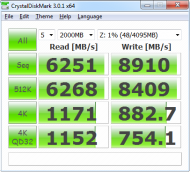
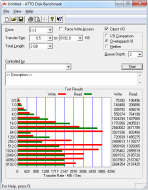
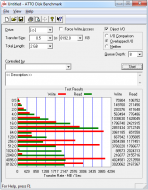
SoftPerfect RAMDisk 3.3.2 (2012-Oct-11) x64 - note that v3.3.1 from Oct06 changelog says "Major optimisation with performance gains 20% to 900% in various tests."
Test : 2000 MB [Z: 1.2% (48.3/4096.0 MB)] (x5)
Date : 2012/10/22 21:33:50
Sequential Read : 8575.204 MB/s
Sequential Write : 9629.429 MB/s
Random Read 512KB : 7506.314 MB/s
Random Write 512KB : 7784.935 MB/s
Random Read 4KB (QD=1) : 1538.529 MB/s [375617.4 IOPS]
Random Write 4KB (QD=1) : 1067.687 MB/s [260665.8 IOPS]
Random Read 4KB (QD=32) : 1490.878 MB/s [363983.8 IOPS]
Random Write 4KB (QD=32) : 901.656 MB/s [220131.0 IOPS]
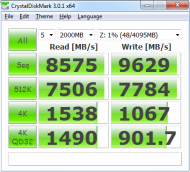
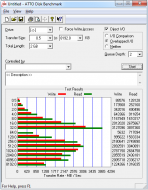
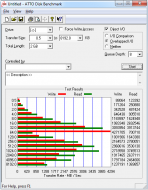
ImDisk 1.5.7 (2012-Jul-30)
Test : 2000 MB [Z: 1.2% (48.3/4096.0 MB)] (x5)
Date : 2012/10/22 21:56:39
Sequential Read : 5955.938 MB/s
Sequential Write : 8793.090 MB/s
Random Read 512KB : 5747.944 MB/s
Random Write 512KB : 8380.221 MB/s
Random Read 4KB (QD=1) : 670.431 MB/s [163679.4 IOPS]
Random Write 4KB (QD=1) : 563.793 MB/s [137644.7 IOPS]
Random Read 4KB (QD=32) : 1519.625 MB/s [371002.2 IOPS]
Random Write 4KB (QD=32) : 1135.113 MB/s [277127.1 IOPS]
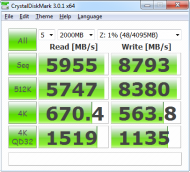
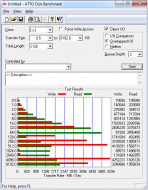
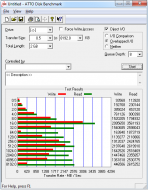
I think my recommendation henceforth is going to be SoftPerfect. It's fast, it's free and it's got an uncluttered interface (ImDisk is somewhat raw and messy), and it can do differential image saves instead of dumping the entire memory contents (saves quite some time if saving a large ramdisk). Also worth noting is that adding a new drive is instantaneous in ImDisk and SoftPerfect, whereas it takes quite a while (up to a minute or so) in RamDiskPlus.
EDIT 2012-11-07: added links for softperfect and imdisk.